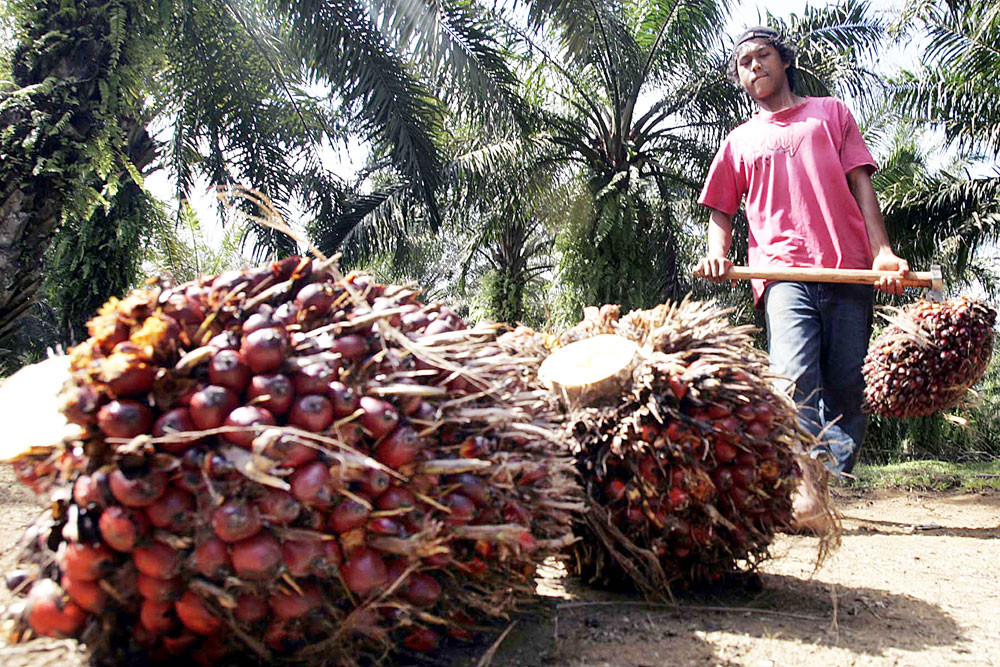Leaving Paris Agreement: Indonesia's loss or the world's?
sexta-feira, maio 17, 2019
 |
| Harvest time: A worker gathers oil palm fruit bunches at a plantation in Lampung. Indonesia and Malaysia, the first- and second-largest palm oil producers, have threatened to challenge the European Union via the World Trade Organization if the EU continues to phase out palm oil from transportation fuel. (The Jakarta Post/R. Berto Wedhatama) |
Angry comments have greeted the announcement of the European Union that Indonesia’s palm oil would be banned as the industry had aggravated deforestation, thus it was not renewable energy. Palm oil is the only commodity dropped out of EU’s list of renewable energy source due to its correlation to deforestation. Indonesian President Joko “Jokowi” Widodo and Malaysian Prime Minister Mahathir Mohamad have reacted by sending an official joint letter to the bloc earlier this month.
Coordinating Maritime Affairs Minister Luhut Binsar Pandjaitan retorted Indonesia could pull out of the Paris Agreement, following in the steps of the United States and lately Brazil. Although there have been no clear signs in this direction, it's worth weighing the costs of leaving the international agreement.
In 2015, 196 nations gathering in Paris signed a historic pact, committing the signatories to the global goal to reduce the world's temperature increase to 2 degrees Celcius above pre-industrial levels.
Yet despite overwhelming enthusiasm, the Paris Agreement is still far from achieving its goals. According to Climate Action Tracker, a website run by three environmental research organizations, the global temperature is expected to rise by 3.3 degrees Celsius above pre-industrial levels with current environmental policies. Even with optimistic policies, temperature increases are still expected to reach 3 degrees Celsius, meaning nations still need to work hard to reduce the global temperature by a full degree if they wish to achieve their initial goals.
Following the announcement of US President Donald Trump in 2017 that stated the US would withdraw from the Paris Agreement, his administration cited high economic costs as the main reason. However Trump’s campaign built on pro-coal mining rhetoric while proposing anti-climate change policies have doubts that high economic costs were truly the main factor.
Brazil's announcement of their withdrawal plans was more of a surprise, especially considering their efforts to reduce deforestation of the Amazon. However, nations are now worried that new leader Jair Bolsonaro will fulfill his early campaign promises and drop out of the Paris Agreement.
Luhut’s comments were likely spontaneous without looking at previous research or considering the costs of the threat. Thankfully, after the US's withdrawal from the agreement, many researchers have looked into the costs of leaving the agreement, as well as the benefits of staying.
Research on the economic impacts of the Paris Agreement was conducted by the World Bank in 2018, using international trade data to comprehensively estimate the impacts of the implementation of the Paris Agreement towards domestic gross domestic product. The results were positive, albeit negligible -- assuming that the Paris Agreement would be able to reduce the price of renewable energy by 25 percent, Indonesia would be expected to see an uptick in GDP by 0.22 percent and increase in investment by 0.47 percent. A small benefit, but still proof that there is no significant loss incurred by Indonesia by staying within the Paris Agreement.
But what are the costs of leaving? Stanford researchers studied the US withdrawal from the Paris Agreement, correlating changes in global temperature with economic performance, with the correlation results being used to predict the impact of rising temperatures on future economic outcomes. The results? Trillions of dollars lost in the global economy, with US$6 trillion losses in the US alone. Of course, expected outcomes for the US cannot be generalized, and it would be fair to say Indonesia would not experience similar losses. But the research still projects that failure to meet the agreement's goals would reduce at least 25 percent of the global GDP by the end of the century -- a hefty cost that can be avoided with the right policies.
Additionally, as Indonesia is dependent on agriculture, the nation has experienced first- hand the high cost of unbridled climate change. Many papers have pointed out how climate change causes unpredictable weather fluctuations, which in turn affects the agricultural sector, causing negative impacts to rural households in Indonesia which mostly rely on agricultural work. Furthermore, research from the Australian National University studying data from 140 countries showed that Indonesia could expect climate change to reduce domestic GDP by 13.267 percent in the long run.
The conclusion of the studies are simple: leaving the Paris Agreement is a rash decision for Indonesia, especially considering the potential benefits from staying, such as cheaper renewable energy, increased productivity in agriculture and a higher GDP, to name a few. Therefore in defending the palm oil industry and exports, a more reasonable response would be to conduct negotiations through diplomatic channels, such as President Jokowi’s recent letter to the EU, asking them to reconsider their stance on palm oil.
Indonesia should still stay in the Paris Agreement for the good of the world as a whole. As the world’s tenth largest greenhouse gas emitter, while also housing the third largest tropical forest area in the world, Indonesia’s commitment to reduce emissions and protect the environment is crucial to the welfare not only of their domestic population, but to the world. Leaving the Paris Agreement and cutting back on policies to protect the environment could lead to catastrophic environmental outcomes -- if not within the next five years, then by the end of this century.
So before Indonesia rushes to join the company of Brazil and the US, it’s important that Indonesia take time to fully research the impacts of leaving the monumental agreement. Disputes over palm oil can be resolved with peaceful negotiations and diplomatic roundtables, but damages to the environment cannot be as easily resolved.
Page: The Jakarta



















0 comentários
Agradecemos seu comentário! Volte sempre :)